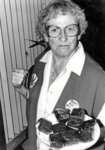

Happy Pride Month, stoners of Lansterdam! This week, we’re going back in time to learn about the legendary cannabis activist Mary Jane Rathbun, aka “Brownie Mary,” and her work during the height of the HIV/AIDS epidemic.
Rathbun was born Dec. 22, 1922, in Chicago and grew up in Minneapolis. Her religious, blue-collar parents encouraged her to attend Catholic school for the majority of her childhood, but a physical altercation with one of the school’s nuns during her teenage years later caused her to leave the school and her parents’ home.
After leaving Minneapolis, Rathbun traveled across the Midwest advocating for causes like labor and abortion rights. She eventually settled in San Francisco during World War II, where she had a short-lived marriage and gave birth to a daughter, Peggy, who accompanied Rathbun when she moved to Nevada.
After Peggy was killed by a drunk driver in the early 1970s, Rathbun returned to San Francisco. She befriended cannabis activist Dennis Peron while at a cafe in the Castro district. Rathbun worked as a waitress at IHOP, and she earned extra money selling cannabis-infused brownies to make ends meet. In the early 1980s, she was baking nearly 600 brownies per day. She advertised her “magically delicious” treats on bulletin boards throughout San Francisco and was eventually discovered by undercover police and arrested twice in a two-year span. The media was in a frenzy over the 57-year-old woman who was caught selling weed brownies out of her house and began calling her “Brownie Mary.”
In 1982, Rathbun was sentenced to 500 hours of community service in lieu of prison time. She began volunteering with the Shanti Project, a support group for those suffering from HIV and AIDS. This work inspired Rathbun to continue volunteering and working with those affected by HIV and AIDS for the rest of her life. By 1984, she was a volunteer in San Francisco General Hospital’s AIDS ward, where she continued baking her cannabis-infused brownies for patients suffering from the illness.
During this time, people living with HIV and AIDS were at a high risk of illnesses like Kaposi’s sarcoma, a rare form of skin cancer, and other health issues like severe weight and muscle loss, lack of appetite and fatigue. Many patients turned to cannabis to help increase their appetite, slow their weight loss and ease their overall suffering. Brownie Mary’s baked goods allowed patients to feel some relief during their lowest points.
“If the narcs think I’m gonna stop baking brownies for my kids with AIDS, they can go fuck themselves in Macy’s window,” Rathbun said during a rally in front of San Francisco City Hall in 1992.
Rathbun never made money from the sale of her brownies. In fact, any money she did make went right back into buying ingredients and other supplies to make more brownies. She continued to work as a waitress for decades in addition to volunteering and lived most of her life in the public housing system.
In 1992, the San Francisco Board of Supervisors declared Aug. 25 “Brownie Mary Day” in recognition of her work at San Francisco General Hospital. That same year, Rathbun helped Peron and his spouse, John Entwistle Jr., open the San Francisco Cannabis Buyers Club, the first public cannabis dispensary in the country. This momentous win, combined with the tireless advocacy work of Rathbun and others, helped California pass Proposition 215, otherwise known as the Compassionate Use Act of 1996, which permitted the use of medical cannabis in California. Proposition 215 was a huge victory for cannabis legalization and began a domino effect of medical cannabis legalization in other states.
“It wasn’t the hippies per se, it wasn’t the standard establishment marijuana movement players, but it was the gay people who legalized pot in California because of the AIDS epidemic,” Entwistle said of the reason for medical marijuana legalization across a majority of the country.
Rathbun died from a heart attack in 1999 at the age of 76. A week after her death, more than 300 people gathered in the Castro district for a candlelight vigil to honor her life. Many friends described her as the “Florence Nightingale of the medical marijuana movement.” Her memory, as well as the memory of the more than 40 million people who have died of HIV/AIDS since the beginning of the epidemic, will never be forgotten.
Support City Pulse - Donate Today!
Comments
No comments on this item Please log in to comment by clicking here